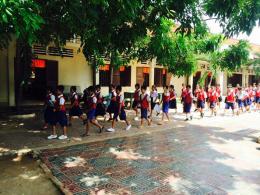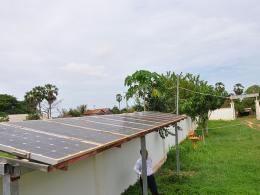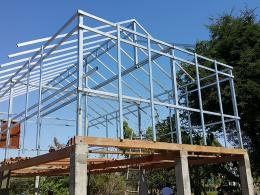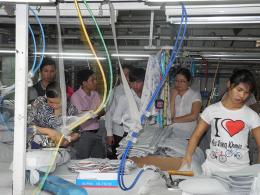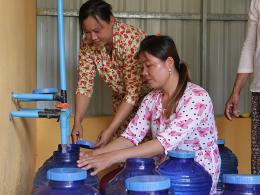Resilience and Adaptation Planning for Ecosystem and Sustainable Development, RAPESD
Background
FAEC Cambodia established and formally registered with Ministry of Interior on 17 January 2019. FAEC Cambodia has its functions with the dynamic and potential efforts to strengthen and support the farmers’ organizations on the fields of organizational development; women & youth empowerment in the agriculture sector and managerial structure; entrepreneurship, access to finance and market; collective business and agriculture technique; innovative irrigation and waste management; and environment. About 73% of households in Battambang and indicated, 95% of population in Kampong Thom are engaged in agriculture and they’re the rice farmers. The heavier floods and longer dry season or drought are now the major problems hitting farmers and affecting the food security and exports after drought left much land in the Northwest dry and cracked. Usually, from May to August in the years, there was severe impact from the climate change to the dry paddy season, vegetables, and fruit trees. The consequence of climate change is unpredictable,
but it affected soil erosion and the risk of losing topsoil. The survey in 2020 with more than 100 ACs, it showed that 30-40% of dry seasonal paddy was affected by drought and they’re replanted. The remaining 60% was recovered but the yield decreased from 4 to 3 tonnes per hectare. Therefore, the harvest season in the years were lower and delayed until mid-October or November. Nowadays, the lower reaches of the Mekong River are also a concern for the farmers along the Tonle Sap Lake.
The results of trials with 220 farms that using 23 different types of horticultural crops serve as solid evidence base for the intervention proposed in this project, aiming to integrate the use of biochar into practices. The results from these trials fit in perfectly with CCSP aims of increasing livelihoods through a 10% increase in crop production, it’s showed that the marketable yield of horticulture crops increased by 29% on average with the application of biochar in both wet and dry seasons on different soil types.
Overall Objective
Boost affordable usages of carbon based agri-inputs in climate change resilience for ecosystem and sustainable development
Specific Objectives
1. Increased climate resilience, agroecosystem sustainability and food and economic security of the smallholders and vulnerable groups through adaptation planning, training on climate smart agriculture techniques;
2. Access to affordable carbon based Agri-inputs (Carbon based fertilizers, biochar, natural pesticides) to build long term soil resilience, increase yields and food security; and
3. Identify pathways for smallholder farmers to access international carbon finance in exchange for increasing the
carbon content of their soil using carbon-based fertilizers and other biochar-based products.
Approach
The project works to be benefited to the smallholder farmers and agriculture cooperatives (ACs) by partnering with HUSK and PDAFF for:
- Capacity building of ACs and beneficiaries on climate resilient farming practices, financial management skills, empowerment of youth and women farmers.
- Model farms: The implementation of model farms shows casing climate resilient practices and the field visits organized result in more farmers in the local communities adopting these practices as well and ACs and producer groups adapted the model- resilient farms with the securable and sustainable harvests.
- Boost for access to use the high-qualifies carbon-based inputs to increase yields by at least 15% for horticulture crops leading to revenue increase for them.
- Pathways to access carbon finance to overcome barriers to access carbon finance such as high-cost certification, complexity of voluntary carbon-credit platforms, limited knowledge regarding verification, monitoring and reporting.
- Better access to markets: Access to finance through the loan without collateral scheme and social accountability and civic engagement with sub-national administration are applied that they’re encouraged to deal with relevant stakeholders through B2B workshop and the democratic development context.
Outputs and Key Activities
| Result | Key Activities |
|---|---|
|
|
Knowledge Products
• Needs assessment & baseline report • workshops & training materials • endline evaluation report • calculation tool of return on investment (ROI) • strategic and business plan • status of animal feed formula • format of model-resilient farms • resilient and non-resilient farms evaluation report • format of AC’s meeting and management
• AC accounting and financial management form • report of research on carbon finance
| Timeframe | Total Budget | Partners | Location |
|---|---|---|---|
|
01 June 2021 – 30 November 2023 |
USD 179,820 (Total) USD 99,810 (Contributed from CCCA) |
HUSK, PDAFF, 10 ACs |
Battambang and Kampong Thom provinces |


